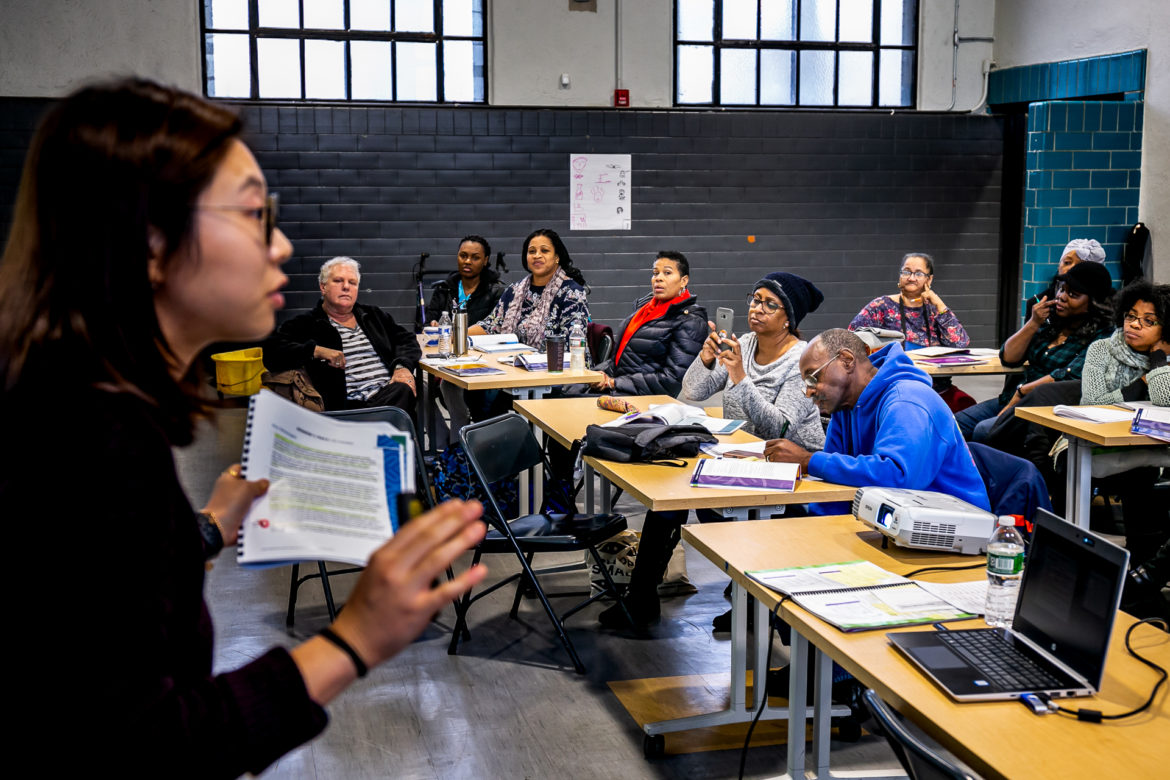By Roshan Abraham. This article originally appeared in City Limits.

December 5, 2018: Jinny Jang conducting Thrive NYC’s Mental Health First Aid training class at the Highbridge Recreation Center in Manhattan. The day long program introduces participants to the unique risk factors and warning signs of mental health problems in adults over the age of 65. / Photo: Adi Talwar
When two suicides by seniors occurred within a year at Knickerbocker Village, a 1,590-apartment housing complex in the Two Bridges section of Manhattan’s Lower East Side, it rocked the community, says Councilmember Margaret Chin, who represents the 1st Council District where the complex sits.
In November of 2017, a terminally-ill Chinese community leader in his 60’s took his own life. Months later, in July of 2018, a 78 year-old former tenant association president and Vietnam veteran committed suicide.
Knickerbocker Village provides mental-health services for seniors through its Naturally Occuring Retirement Community, or NORC, an unplanned retirement community where senior services are funded through a combination of the city’s Department for the Aging (DFTA), New York State Department of Aging and City Council funds. Chin observed that the programs were helpful in the aftermath of the suicides.
“They were able to provide workshops to help seniors cope with that situation,” Chin says, including bilingual services for the building’s Chinese immigrant population.
Throughout the city, however, mental-healthcare funding and services are uneven at the city’s senior centers and NORCs, and neighborhood resources often determine what mental-healthcare seniors receive.
While Knickerbocker Village provides a range of services meant to facilitate community, including holiday celebrations and trips, many NORCs and senior centers lack funding for on-staff social workers, relying instead on caseworkers with less mental-health training who could be less likely to detect depression ahead of time.
In an effort to detect warning signs of mental illness in more of New York City’s seniors, Councilmember Diana Ayala introduced Intro 1180 last October, a bill that would mandate Mental Health First Aid training for caseworkers at all city-run senior centers and require a refresher course be taken every three years.
The trainings are meant to help anyone, regardless of previous mental-health training, detect signs of mental illness, provide immediate support and connection to more services. The city has already committed to training 250,000 New Yorkers in Mental Health First Aid over four years through the First Lady’s Thrive NYC Initiative, but no mandate exists for the training at senior centers, and not all senior center caseworkers have received the training.
New York has 27 NORCs and 249 city-run senior centers which are all managed by DFTA. Agency officials say that city-run Senior Centers – which provide a community hub for seniors – all have caseworkers who regularly screen every senior for mental health. And referrals are provided for outside care, according testimony from outgoing DFTA head Donna Corrado in her final City Council hearing on November 19.
To read the rest of this article, check out the full version on City Limits.
The opinions expressed in this article are those of the author and do not necessarily reflect those of the Diverse Elders Coalition.
